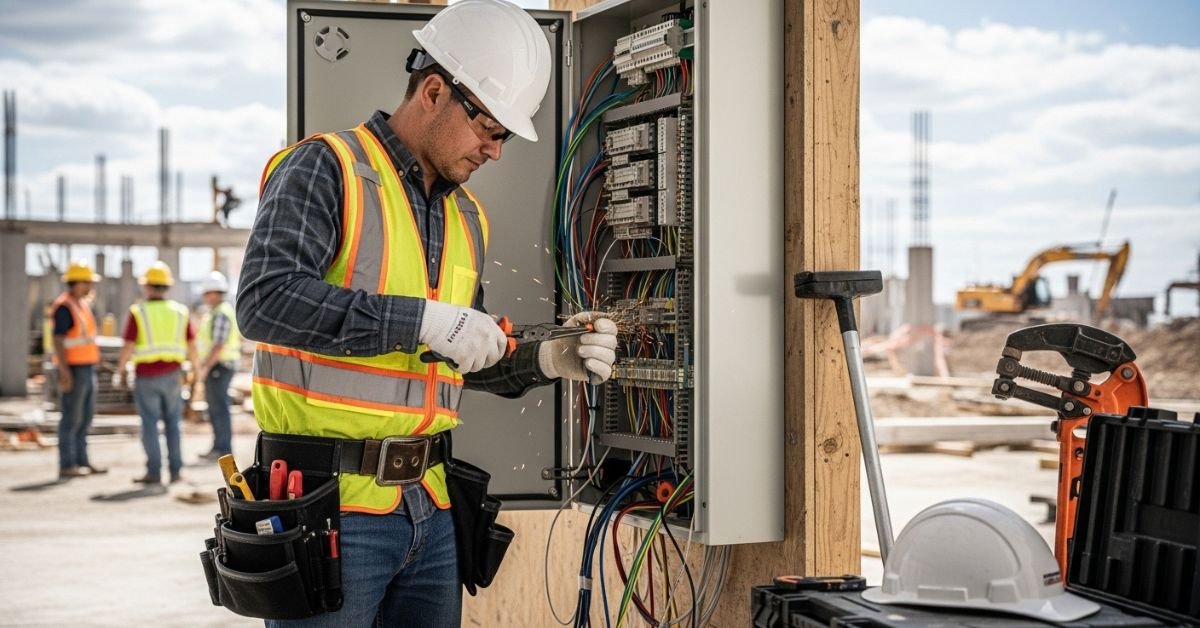Construction projects depend on precise planning and smooth coordination among multiple trades, and a single delay can affect the entire timeline. Among the most important contributors to keeping a project on track are licensed electricians. Electrical work is often integrated into every stage of construction, from underground wiring and framing to finishing touches and system testing. Without timely electrical installation, other phases, such as drywall, HVAC, plumbing, or inspections, cannot proceed. Licensed electricians bring not only technical skill but also organization, communication, and problem-solving capabilities that ensure progress continues without unnecessary delays.
They understand building codes, safety requirements, and the sequence of tasks needed to complete electrical systems efficiently. When electricians are involved early and work closely with project managers, they help prevent costly mistakes, accelerate workflows, and keep the project synchronized. Their ability to adapt, coordinate, and deliver reliable results makes them essential in maintaining the momentum of the entire construction timeline.
Planning and Coordination
Contents
Timely Installation and Workflow Management
One of the key reasons licensed electricians keep construction projects on schedule is their ability to complete electrical work in alignment with the project timeline. Electrical tasks must be performed at specific stages, and if those stages fall behind, other trades cannot proceed. For example, electricians must install wiring before walls are closed, and outlets and fixtures must be installed before final inspections. Licensed electricians understand these phases and work closely with general contractors to schedule each task appropriately.
They anticipate what materials and permits are needed, preventing delays caused by missing supplies or documentation. Their familiarity with code requirements ensures that the installation passes inspections the first time, avoiding rework that can push the schedule back. Additionally, licensed electricians communicate with other trades to avoid conflicts in tight spaces and ensure that electrical pathways are clear before other components are installed. By staying organized and proactive, they reduce downtime and enable the project to move smoothly from one phase to the next.
Problem-Solving and Preventing Delays
Construction rarely goes exactly as planned, and unexpected challenges often arise. Licensed electricians help keep projects on schedule by quickly identifying and resolving issues before they escalate into significant delays. Whether dealing with design changes, material shortages, or structural obstacles, experienced electricians can adjust their approach without slowing progress. Their knowledge enables them to find safe, efficient alternatives when original plans no longer fit the on-site conditions. They also communicate changes to project managers to keep everyone informed and aligned. By addressing issues early, they prevent holdups that could delay inspections or require other trades to wait
In many cases, electricians are responsible for coordinating power availability during construction to ensure tools and equipment can operate on schedule. The ability to adapt and troubleshoot is a critical part of maintaining momentum. Contractors often rely on dependable electrical professionals, such as an electrician in Havertown, PA, to handle complex wiring tasks and make last-minute adjustments without extending the project timeline.
Ensuring Safety and Compliance from the Start
Safety and compliance with building codes are essential in construction, but when they are not prioritized, they can slow down the entire project. Licensed electricians understand electrical codes and safety standards thoroughly, which helps them install systems correctly the first time. This reduces the risk of failed inspections, which can bring a project to a halt until corrections are made. By following proper procedures and using approved materials, electricians ensure that electrical systems are safe, durable, and ready for inspection at the appropriate stage.
They also help enforce safety on the job site by securing panels and grounding systems, and by ensuring that circuits are correctly labeled. This attention to safety not only prevents accidents but also keeps the project eligible for continued work. In addition, licensed electricians plan by coordinating inspection schedules early, avoiding last-minute rushes. Their commitment to doing things right helps maintain a steady pace and protects the project from avoidable setbacks caused by non-compliance or unsafe installations.
Collaboration with Other Trades and Project Managers
Construction projects require constant communication between trades, and electricians play a central role in that coordination. They often work alongside builders, plumbers, HVAC technicians, and inspectors to ensure each phase is completed in harmony. Licensed electricians keep projects on schedule by updating project managers on progress, providing accurate timelines, and adjusting plans when other trades encounter delays. Their flexibility allows the team to resequence tasks without losing efficiency.
For example, if another trade is running behind, electricians may shift focus to another area of the site to maximize productivity. By working collaboratively, they help maintain workflow and prevent bottlenecks. Electricians also provide valuable input during planning meetings, helping identify potential layout conflicts before construction begins. This proactive approach reduces the likelihood of having to tear down completed work to make room for electrical installations. With clear communication and teamwork, licensed electricians help create a seamless workflow that keeps the project moving forward until completion.
Keeping a construction project on schedule requires more than just skill—it requires coordination, foresight, communication, and reliability. Licensed electricians contribute to this efficiency by aligning their work with the project timeline, managing each stage of electrical installation with precision, and ensuring inspections are completed without delay. Their ability to solve problems quickly and adapt to changing conditions helps prevent setbacks that could disrupt the entire job.
By prioritizing safety and compliance, they avoid rework and protect both workers and the property. In collaboration with project managers and other trades, electricians maintain workflow and ensure each task fits within the larger construction plan. When licensed electricians are involved from the planning stage through final installation, the project benefits from improved organization and steady progress. Their role is essential in transforming plans into functional spaces on time and with minimal complications. With skilled electricians on the team, construction projects stay on schedule, budgets remain intact, and the final results are safe, efficient, and ready for use.
